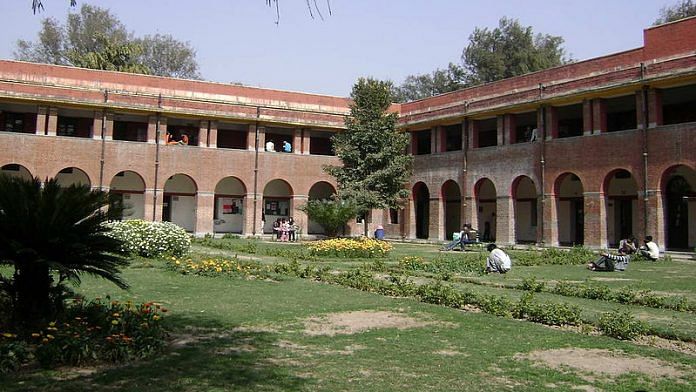The new initiative is set to target 20 countries for Indian institutes to collaborate with, including the US, UK and many European nations.
New Delhi: The Narendra Modi government has identified 20 countries with which it will actively pursue academic and research collaboration in the coming years.
Tentatively christened ‘Target 20’ or T20, this mission will focus on building India’s academic engagements with select nations instead of generalised educational agreements with a wider range of countries, ThePrint has learnt.
It is also expected to address a key parameter that is said to pull down Indian institutes on global academic rankings — ‘internationalisation’ — which is an assessment of institutes’ engagement with foreign students, international institutes, and collaborative global research.
T20 aims to address this concern, as well as forging more meaningful research collaborations with countries of India’s interest, sources in the human resource development (HRD) ministry said.
What’s the plan?
While India does have a range of education-related agreements with a number of countries, they were signed largely as part of bouquets of MoUs inked with visiting foreign delegations on bilateral visits. These largely do not translate into very significant academic exchanges.
T20 aims at replacing this generalised approach with more focussed educational relationships with select nations to encourage faculty exchange and joint research projects with prestigious institutes all over the world.
The United States and the United Kingdom are two of the obvious names in the list of nations. Europe is represented by Norway, Sweden, Netherlands, Switzerland, Portugal, Austria, Italy, Spain, France and Germany. Russia, Canada, Israel, South Africa and Australia are also on the list, while Asia is represented by Singapore, South Korea and Taiwan.
The Indian government wants the T20 initiative to be institution-led, and accordingly, 20 top Indian institutes will front the country-specific outreach. The IITs, Indian Institutes of Science and the Jawaharlal Nehru University are expected to be among the institutes that will lead collaborations. An amount of Rs 300 crore is expected to be set aside for this scheme.
Parallel projects
While the T20 project will work to deepen academic and research collaboration with select countries, ‘Study in India’ will run alongside it, aimed at drawing nearly one lakh foreign students to Indian institutes. The two projects will work simultaneously on different sets of countries to achieve greater global equity for Indian educational institutes.
Additionally, elaborate India education fairs will be held in 25 countries to target foreign students by branding India as an attractive education destination. Indian institutes will admit foreign students on the basis of their SAT scores and assure fee waivers ranging from 25 per cent to 100 per cent depending on the scores achieved.




You can collaborate with Harvard and Yale, and you ll still get low quality graduates because this government has Zero scientific temperament and zilch consideration for diversity that’s necessary to form a well rounded syllabus. This govt is moving 100 years back with its Manuvad revisionism. Before playing T20, first learn the basics of holding a bat and sending down a ball.
This is a good initiative in the larger interest of the country, in general and academics, in particular. However, we need to avoid certain pitfalls under the present governance system of institutes and regulatory bodies. Accountability, sustainability and quality need to be the main concern. Defaulters must be booked and taken to final end speedily. One more thing, some institutes say 30% may be picked up from rural areas, i.e., institutes of tier 2 and below but having NBA accreditation for professional programs and NAAC for non-professional programs with or without permanent affiliation to the university. The institutes thus selected after 2 years need to improve their international ranking every year so that after 5 years they would come within top 200. Or else, I fear, T20 will face the same fate like that met by Make in India or Skill India, money spent but very limited outcomes.